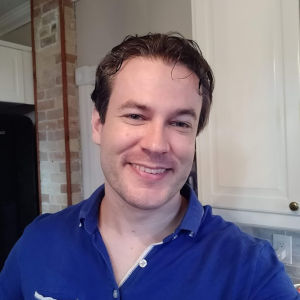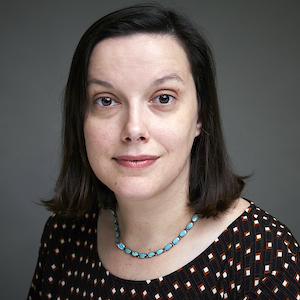Double Agent Profile: James Walker
- Publish Date
- Authors
- James Walker
- Authors
- Cathy Colliver
Name: James Walker
Designation: Agent 0091
Double Agent Role: Senior Software Consultant
Special Skills: Mentoring and leadership
Aliases: jamesjosephwalker
Location: St. John’s, Newfoundland
Favorite Emoji: 😬
What impact are you proudest of in your career?
The brightest moments in my career are when I’ve been able to help someone learn something new or see themselves and the people around them in a new light. It’s one of the highest compliments to build enough trust with someone that they reach out for mentorship, and through collaboration find meaning and success beyond their expectations. A colleague once told me that my greatest strength is that I bring out the best in people, and I’ve kept that in my back pocket ever since.
Looking ahead, what has you most excited for the next year at work?
I’ve had the opportunity to pick up textbooks and fill in gaps in my knowledge that I didn’t know were there, and gain a deeper understanding of the technologies that I work in. In addition, I’ve been able to work with people who can help me with things like DevOps so that I don’t have to be as much of a generalist. In the past I had to be competent with disparate technologies, which made it harder for me to build expertise with the pieces I’m interested in.
What is your favorite thing about being a Double Agent at Test Double?
At Test Double I’m empowered to do my job the way I want to do it. My team expects me to contribute value, make an impact, and improve our clients and our company. But I choose how I work best by defining my own hours, taking time to rest and recover when I need to, working as early or late as I like, going for a walk or working out in the middle of the day, and choosing the activities that I believe will be most effective for accomplishing my goals. Time freedom and flexibility has led to a higher job satisfaction and enabled me to focus on being a better human.
What do you think makes Test Double unique?
Test Double is an ideological company. It’s optimistic and aspirational. And those values that we talk about, we actually put our money where our mouth is in terms of regular salary band evaluations, employee stock ownership, and making decisions around client engagements. We’re only keeping clients that align with our values and work well with us—not just chasing the next dollar. We also make sure that our people are happy. So if something’s not working out on a client engagement, then we’ll move that agent to a different client.
What have you been thinking about a lot lately in software development, and why?
I’ve been thinking about what’s happening as we go about our daily jobs: We’re writing features and solving bugs and doing tests and so on. It’s easy to forget that we’re in the middle of an unprecedented social and technological revolution. We’re right in the midst of some of the most interesting years that people will look back on and say, “Do you remember when they came out with self-driving cars or when virtual reality became mainstream or when these social media giants took over and shook up an election, or when we first started getting meal delivery services or ride sharing programs?” In the same way, it’s interesting watching all of these companies that we support at Test Double actually changing the fabric of society on a day to day basis.
It’s really easy to lose sight of that. We don’t know it’s happening in the moment, because we’re just writing a few lines of code. But as an aggregate, on a global scale, it’s actually changing humanity. And I think it’s doing that in a much bigger way than the industrial revolution changed us, because we’re all connected and it doesn’t matter what country you live in and what time zone you’re in. I think that’s fascinating. That’s got me the most excited. I’m living this, I’m living in the middle of one of the most exciting, interesting times in human history. Maybe that’s hyperbolic, but maybe it’s true.
Tell me about something memorable that happened to you and what you learned from it.
Before university I hadn’t gotten too involved in organized sports but I was very physically active. One day I was on a rowing machine at the gym, and somebody came up and said, “Would you like to join the rowing team?” I said. “Okay. I have no idea what this is all about.” But on and off for the next few years—throughout my university career—I spent time rowing competitively. I would get up every morning at 5:00 AM and train for three or four hours. And I did that for a number of years. It made a huge impact on me, because it was the first time I’d really stuck to something consistently, seen measurable progress and improvement, and then been able to reap those rewards years later after putting in all the effort. I also got to see the sunrise almost every morning on Lake Ontario—except when it was pouring rain! It taught me about discipline and there’s a peculiar kind of joy you get from that type of commitment.
For software developers it can sometimes feel hard to measure your work and how you’re growing or progressing. Is there anything building off that experience of discipline that has helped you around how you’re measuring progress?
When you’re writing code and doing consulting, you’re constantly building skills and improving your knowledge. And you don’t always know that. It’s an unconscious effort. You have to remind yourself that even though it may not seem like a huge improvement, if you do a day of work or read a chapter of a book it’s like one brick in a wall that you’re building which is part of a structure of knowledge or abilities that will never go away.
It’s rare you will have breakthroughs or sudden eureka moments because they are the culmination of hundreds, if not thousands, of hours of less exciting activity. Those less exciting moments are the important ones because though they may not be transcendental they are where the improvement actually happens.
What has you most excited this year outside of work?
I just moved to Newfoundland. I’m not from Newfoundland—and I hadn’t actually visited before I decided to move here. But the province ran a very convincing tourism campaign that said, “If you can work remote, why not work here?” They had other great taglines, like, “Once you’re done working remotely start living remotely,” alongside pictures of absolutely stunning landscapes. There were whales, puffins, icebergs, cliffs, oceans, sunsets, sunrises—this big mix of stunning natural locations. I’ve just moved outside of St. John’s, and so far it’s been a fantastic experience. I really look forward to exploring the province and benefiting from being a remote worker, and hope my family will be equally happy and excited about it.
What book/podcast/movie/TV show have you been thinking about a lot lately, and why?
I’ve recently been watching a series called Upload. It’s about the idea of digitizing the human mind and creating a spiritual playground where people live after their physical body dies. There’s a fair bit of drama and sensationalism, and perhaps some of the more interesting technical science fiction is simplified for the purposes of television. But I’ve been impressed with the nuances of morality and ethics connected to the concept of a connected digital afterlife. How do you pay for your usage of this virtual world? Can people outside come and see you? How do you interact with them? There are so many different concepts that extend on things we’ve seen in the last 10 and 20 years in online dating. What if a person that you’re talking to doesn’t have a physical body? The show is a compelling alternative to the conjecture on how artificial intelligence might impact our society. Instead it examines putting people into computers and how that might impact society. And I think that’s really interesting.
What is the biggest lesson the pandemic taught you?
During the pandemic, I changed jobs twice. Previously, I had been living with an illusion of stability despite the fact that I had grown up in the eighties and nineties and seen the fall of the Berlin wall, the tech bubble grow and burst, the shock of 9/11, the housing market crash and the 2008 recession, and wars, coups, and rebellions around the world. So many unexpected things have happened to us in the last 40 years. I’ve seen it, I’ve grown up with it, I’ve internalized it. But still somehow I convinced myself that I had something stable and that the world was predictable. I thought I could control the outcomes of my life by being really safe, and making conservative decisions—financially and in my career. And then it was like somebody shook a snow globe and everything changed. I realized that was actually an opportunity for me to grow and do better than I had before. I could break molds and schemas, and reinvent myself and that’s still an ongoing process.
What’s something interesting about you that’s not on your resume or LinkedIn?
One of my first jobs was working for Starbucks. I was a fantastic barista and I enjoyed the craft, although I did not always enjoy the customers. But it was fun. And I drank a lot of coffee and I got really good at making caffeinated beverages. I also had a summer job building farms and doing rough carpentry and concrete and roofing and barn stalls. I think it was probably one of the most enjoyable jobs I’ve ever had. Doing physical labor and working with my hands was deeply fulfilling and I learned a lot. I still think about it on a regular basis.
This interview is based on a recorded conversation with James Walker and Cathy Colliver. It may or may not self-destruct.
James Walker
- Status
- Double Agent
- Code Name
- Agent 0091
- Location
- St. John’s, NL
Cathy Colliver
- Status
- Double Agent
- Code Name
- Agent 0080
- Location
- Louisville, KY

